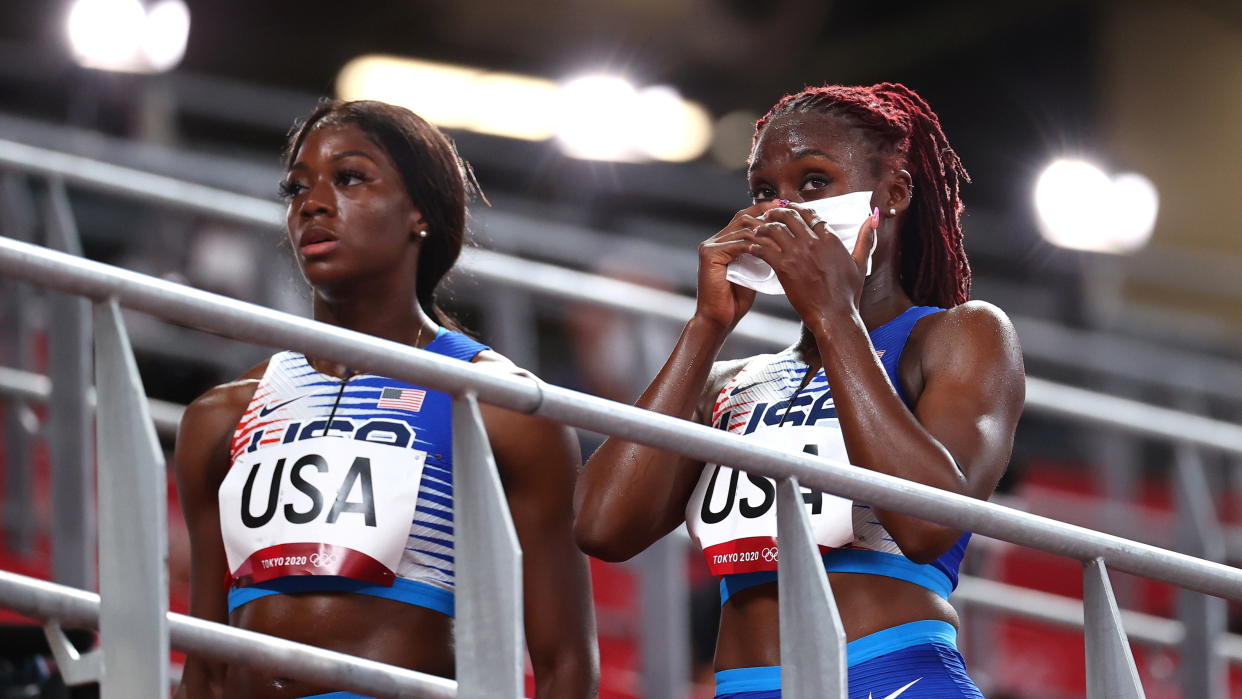United States' gold medal favorite mixed 4x400 relay team disqualified in controversial fashion
TOKYO — The United States has an unfortunate history in the relay races at the Olympics, and on Friday night the mixed 4x400-meter team became part of that lore.
After winning Heat 1 in the debut of the event at the Games, the U.S. team was disqualified for an exchange zone foul on the first handoff, from Elijah Godwin to Lynna Irby. Irby was lined up beyond the legal exchange zone to receive the baton; the blue line for her to line up properly is about two yards before the finish line, and she was 20 meters farther down the track.
The United States appealed the decision, reportedly claiming that one of the officials lined Irby up in the wrong spot. However, it was obvious that Irby was not where she was supposed to be, and it stands to reason someone as experienced in relays as she is likely would have noticed, too.
There was no decision on the appeal as of this writing.
Irby was in tears as she spoke to television reporters as soon as the U.S. quartet walked off the track, but was silent when the group met with written media a few minutes later.
"We come out, we try our best, and it was a complete surprise to all of us," Godwin said. "We heard the news; all we can do is prepare for the future and see what happens next."
"We put our best into it so I'm just proud of everyone's effort," relay runner Taylor Manson said.

As the name suggests, the mixed relay is two men and two women, but it is up to each team to decide the order of their runners. USA went man-woman-woman-man, as five other teams in their heat did. But Nigeria opted for man-woman-man-woman, so anchor leg Patience George had about a 4-second lead when she got the baton from Samson Nathaniel.
But Manson handed off to Bryce Deadmon, and Deadmon had caught up to and passed George with 150 meters to go.
"It was fun," George said, and knowing she was being chased spurred her to what she believes is one of the fastest 400m she's run. "It's not easy running with the men — I had to go. When I [had] the last 100 meters to go I heard them coming and I was thinking, 'no, Patience, you need to go!'"
On the first day of athletics at these Olympics, the night session saw one medal event: the men's 10,000 meters. It was wisely scheduled for an 8:30 p.m. start, but even after an afternoon downpour the humidity in Tokyo kept climbing, and was over 80 percent during the race.
Ethiopia's Selemon Barega, the 2019 World Championships silver medalist at 5000m took the gold in 27:43.22. Uganda claimed the silver and bronze, with world record holder Joshua Cheptegei second (27:43.63) and Jacob Kiplimo (27:43.88) third.
Barega's win marks the sixth Olympic gold for an Ethiopian man in the event, and his final 1000m split of 2:25 is the fastest final 1k in any Olympic 10000m race.
Grant Fisher was the top American finisher, coming in fifth in 27:46.39. That equaled the best American finish at Rio in 2016, when it was Galen Rupp crossing fifth.
Australian Patrick Tiernan doubled over and fell to the track with about 60 meters to go, but got up and completed the race. He was 19th in 28:35.06.
In other qualifying events, two American women advanced to the shot put final. Raven Saunders, nicknamed "Hulk" but rocking a Joker face mask and now green and purple hair to match, had the third-best throw in qualifying, 19.22 meters (63 feet, 1/2 inch); Jessica Ramsey fouled on her first two throws, but posted 18.75m (61-6.25) on her final try to get into the final.
Talkative and cheerful away from the track, Saunders said her mask — which if we're being honest is a little creepy and intimidating — also serves to keep competitors away during her event.
"I always had the mask, and everyone during shot put, I don't know why, but people always [want to] smile and talk and everything like that, and that's not really me, so this is my way of kind of being friendly, I guess, in way," she said with a laugh. "I'm the greatest person, but during competition, I don't like anybody."
The women's 5000m also saw two Americans move to the medal race: Elise Cranny (14:56.14) was fifth in Heat 2 and automatically moved on, while Karissa Schweizer (14:51.34) was seventh in Heat 1 but got in on time since her heat was faster. In that race, the top five in each heat were automatic qualifiers, and the next five fastest times across both heats also moved on.
Burundi's Francine Niyonsaba, not allowed to run her favored race, the 800m, because of World Athletics' targeted, arbitrary and disgusting testosterone-levels rule meant to satisfy those who did not like watching South Africa's Caster Semenya continue to win the 800m but led to several other African women not being allowed to run their chosen race or not run at all, was in Heat 2 of the 5000m and finished in the top 5 only to be disqualified for a lane violation.
Gold-medal favorite Yulimar Rojas led qualifying for women's triple jump with her best of 14.77m (48-5.5) on her first jump. American Keturah Orji will be in Sunday's final thanks to her 14.26m (46-9.5) on her first attempt.
More from Yahoo Sports:
